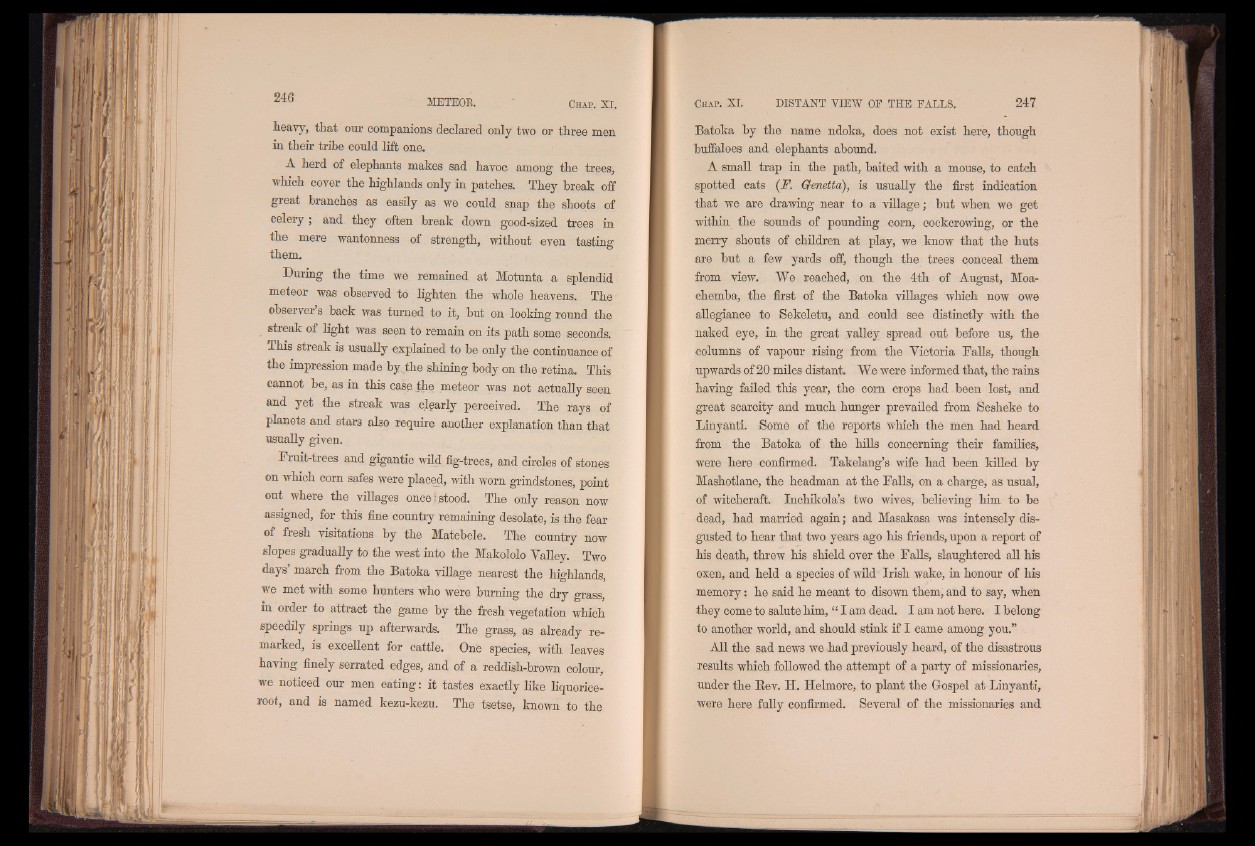
heavy, that our companions declared only two or three men
in their tribe could lift one.
A herd of elephants makes sad havoc among the trees,
which cover the highlands only in patches. They break off
great branches as easily as we could snap the shoots of
celery ; and they often break down good-sized trees in
the mere wantonness of strength, without even tasting
them.
During the time we remained at Motunta a splendid
meteor was observed to lighten the whole heavens. The
observer s back was turned to it, but on looking round the
streak of light was seen to remain on its path some seconds.
This streak is usually explained to be only the continuance of
the impression made by the shining body on the retina. This
cannot be, as in this case the meteor was not actually seen
and yet the streak was clearly perceived. The rays of
planets and stars also require another explanation than that
usually given.
Fruit-trees and gigantic wild fig-trees, and circles of stones
on which corn safes were placed, with worn grindstones, point
out where the villages once I stood. The only reason now
assigned, for this fine country remaining desolate, is the fear
of fresh visitations by the Matebele. The country now
slopes gradually to the west into the Makololo Talley. Two
days’ march from the Batoka village nearest the highlands,
we met with some hunters who were burning the dry grass,
in order to attract the game by the fresh vegetation which
speedily springs up afterwards. The grass, as already remarked,
is excellent for cattle. One species, with leaves
having finely serrated edges, and of a reddish-brown colour,
we noticed our men eating: it tastes exactly like liquorice-
root, and is named kezu-kezu. The tsetse, known to the
Batoka by the name ndoka, does not exist here, though
buffaloes and elephants abound.
A small trap in the path, baited with a mouse, to catch
spotted cats (F. Grenetta), is usually the first indication
that we are drawing near to a village; but when we get
within the sounds of pounding corn, cockcrowing, or the
merry shouts of children at play, we know that the huts
are but a few yards off, though the trees conceal them
from view. We reached, on the 4th of August, Moar
chemba, the first of the Batoka villages which now owe
allegiance to Sekeletu, and could see distinctly with the
naked eye, in the great valley spread out before us, the
columns of vapour rising from the Victoria Falls, though
upwards of 20 miles distant. We were informed that, the rains
having failed this year, the corn crops had been lost, and
great scarcity and much hunger prevailed from Sesheke to
Linyanti. Some of the reports which the men had heard
from the Batoka of the hills concerning their families,
were here confirmed. Takelang’s wife had been killed by
Mashotiane, the headman at the Falls, on a charge, as usual,
of witchcraft. Inchikola’s two wives, believing him to be
dead, had married again; and Masakasa was intensely disgusted
to hear that two years ago his friends, upon a report of
his death, threw his shield over the Falls, slaughtered all his
oxen, and held a species of wild Irish wake, in honour of his
memory: he said he meant to disown them, and to say, when
they come to salute him, “ I am dead. I am not here. I belong
to another world, and should stink if I came among you.”
All the sad news we had previously heard, of the disastrous
results which followed the attempt of a party of missionaries,
under the Bev. H. Helmore, to plant the Gospel at Linyanti,
were here fully confirmed. Several of the missionaries and